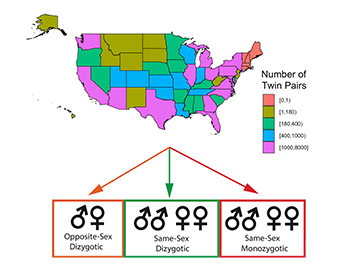
When it comes to disease and health, which is more powerful—zip code or genetic code?
The degree to which nature and nurture affect disease and health remains one of the eternal—and still unanswerable—questions in medicine.
Now a team of investigators from Harvard Medical School and the University of Queensland in Australia have tackled this question in a decidedly novel way.
 In what the researchers describe as a coup for big data and a scientific first, the team has used a massive insurance database of nearly 45 million people in the United States including thousands of twin pairs to determine the effects of genes and environment in 560 common conditions. The diseases analyzed span 23 categories, ranging from cardiovascular illness and neuromuscular diseases to skeletal conditions.
In what the researchers describe as a coup for big data and a scientific first, the team has used a massive insurance database of nearly 45 million people in the United States including thousands of twin pairs to determine the effects of genes and environment in 560 common conditions. The diseases analyzed span 23 categories, ranging from cardiovascular illness and neuromuscular diseases to skeletal conditions.
The work, published Jan. 14 in Nature Genetics, is thought to provide the largest assessment of U.S. twins to date, the researchers said. It is also the first one to go beyond the traditional one-disease-at-a-time approach and analyze hundreds of the most common conditions among more than 56,000 twin pairs. To date, most twin or familial studies of genes and environment have looked at a single disease or one environmental factor at a time.
Many diseases are neither purely genetic nor purely environmental but rather the result of a complex interplay between the two. Unlike classic inherited conditions—those caused strictly by mutations in a gene or a set of genes—environmentally fueled conditions are the sole result of factors external to an individual’s biology. Most diseases do not fall neatly in either category but have elements of both. Disentangling how genes and environment contribute to multiple diseases in the same population has been astoundingly difficult, the researchers said. The new study aims to solve this challenge by developing a new large-scale analytical approach.
“The nurture-versus-nature question is very much at the heart of our study. We foresee the value of this type of large-scale analysis will be in shining light on the relative contribution of genes versus shared environment in a multitude of diseases,” said senior study author Chirag Patel, assistant professor of biomedical informatics in the Blavatnik Institute at Harvard Medical School.
Continue reading article in Harvard Medical School News
Also See
Dynamic duos: Why science loves twins — CNN
'Nature versus nurture' study finds 40% of diseases are driven by DNA — Daily Mail
Twins’ Study Looks At Gene’s Role in Disease — WebMD
Which affects health more – DNA code or ZIP code? — NBC News
Nature or Nurture? Twins Study Helps Sort Out Genes' Role in Disease — US News & World Report, HealthDay
Nature beats nurture when it comes to causing diseases, study finds — Axios
Largest study of American twins traces influence of genes and environment on disease — Washington Post, Chicago Tribune
Massive Harvard-led genetic twin study homes in on the nature versus nurture debate — New Atlas
Two of every five common diseases influenced by genetics, twins study says — United Press International
Influences from Here and There — GenomeWeb
Twins Study Sheds Light on Health Drivers — US News & World Report
Largest US twin study probes whether nature or nurture makes us sick — The Verge